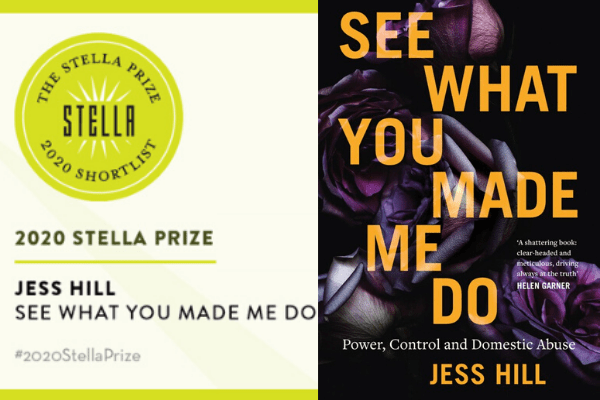Journalist Jess Hill has won the 2020 Stella Prize for her non-fiction book ‘Look What You Made Me Do’ at an award ceremony broadcast online on Tuesday evening. The book is a seminal exploration of domestic abuse in Australia and has attracted wide spread acclaim since its publication in June last year.
“I wrote this book because it needed to be written,” Hill said in her acceptance speech. “In the forty years since the first shelter opened in Australia, nobody had written a book that revealed the private and public phenomenon of domestic abuse in this country. That had to be rectified.”
Hill has been writing about domestic violence since 2014, and her journalism has won two Walkley awards, an Amnesty International award and three Our Watch awards.
“To be honoured by a prize that operates with the highest integrity is such a thrill. I feel like I’ve been initiated into a circle of writers at the height of their craft, and for that I am just so grateful.”
“My hope is that the Stella Prize will get more international publishers interested, and that people who never thought they’d read a book about domestic abuse will be persuaded to pick it up. This book has taught me so much about life, love and power. It is not a book about other people, it is a book about all of us, and the world we live in.”
Hill spoke to Women’s Agenda in an interview and said, “If the function of journalism is to undercover concealed truths, then this [domestic abuse] is one of the biggest concealed truths that we have.”
The event was hosted by Patricia Karvelas and featured guest speaker, the Hon. Julia Gillard AC.
“We’re finding ourselves in genuinely unprecedented times,” Karvelas told audiences who tuned in last night. “It’s difficult, it’s smashing the arts community and its making our lives more difficult than it ever has been.”
“What we must not allow to continue however, is for the further marginalisation of women’s voices through this time. The integral work of The Stella Prize and its supporters in championing women’s voices must continue. It is more important than ever.”
Former Prime Minister Julia Gillard gave the keynote in a pre-recorded speech, saying “It is vital to address gender bias in the literary world. If women’s voices are disproportionately excluded from our storytelling, then we cannot weave a more inclusive and richer shared culture.”
She addressed the impact of gender discrimination and the barriers that minimise women’s career potential.
Last night’s event was hosted by The Wheeler Centre and was live-streamed through Guardian Live, who are partners with the organisation.
Louise Swinn, Chair of the 2020 Stella Judging Panel, said Hill’s “incredibly powerful book, meticulously dismantles all of the lazy old lies we associate with domestic abuse.”
“In scrutinising both cause and response from every angle, Hill addresses each question head-on – even the most challenging aspects. Using forensic investigation, and highlighting personal stories, this book does much more than draw attention to this crisis – it offers solutions for reform. The statistics are utterly horrifying, and Hill’s extraordinary call to action cannot be ignored.”
Other judges included journalist Monica Attard, journalist Jack Latimore, author and editor Zoya Patel and poet Leni Shilton, all of whom read over 150 powerful books in total before reaching their winner.
“The world is in crisis,” Patel said last night in a pre-recorded video. “But our artists are expressing themselves as powerfully and eloquently as ever, as they courageously grapple with the world’s mess.”
Swinn wrote in a statement published on The Stella Prize site about the importance of staying curious and trying to better understand the world through books.
“Reading becomes more and more of an imperative – we need to be rangy readers – to read widely, wider than ever, read more to make sense of what’s going on and challenge our sense of the world and the way we view the world around us.”
This is the second non-fiction book to win the $50,000 prize.

